Parliamentary Submission on Universal Basic Income
VerifiedAdded on 2023/04/10
|12
|3188
|177
AI Summary
This parliamentary submission discusses the need for the federal government to provide a universal basic income (UBI) to all Australians. It explores the benefits and challenges of implementing UBI and argues for its effectiveness in addressing poverty and unemployment.
Contribute Materials
Your contribution can guide someone’s learning journey. Share your
documents today.
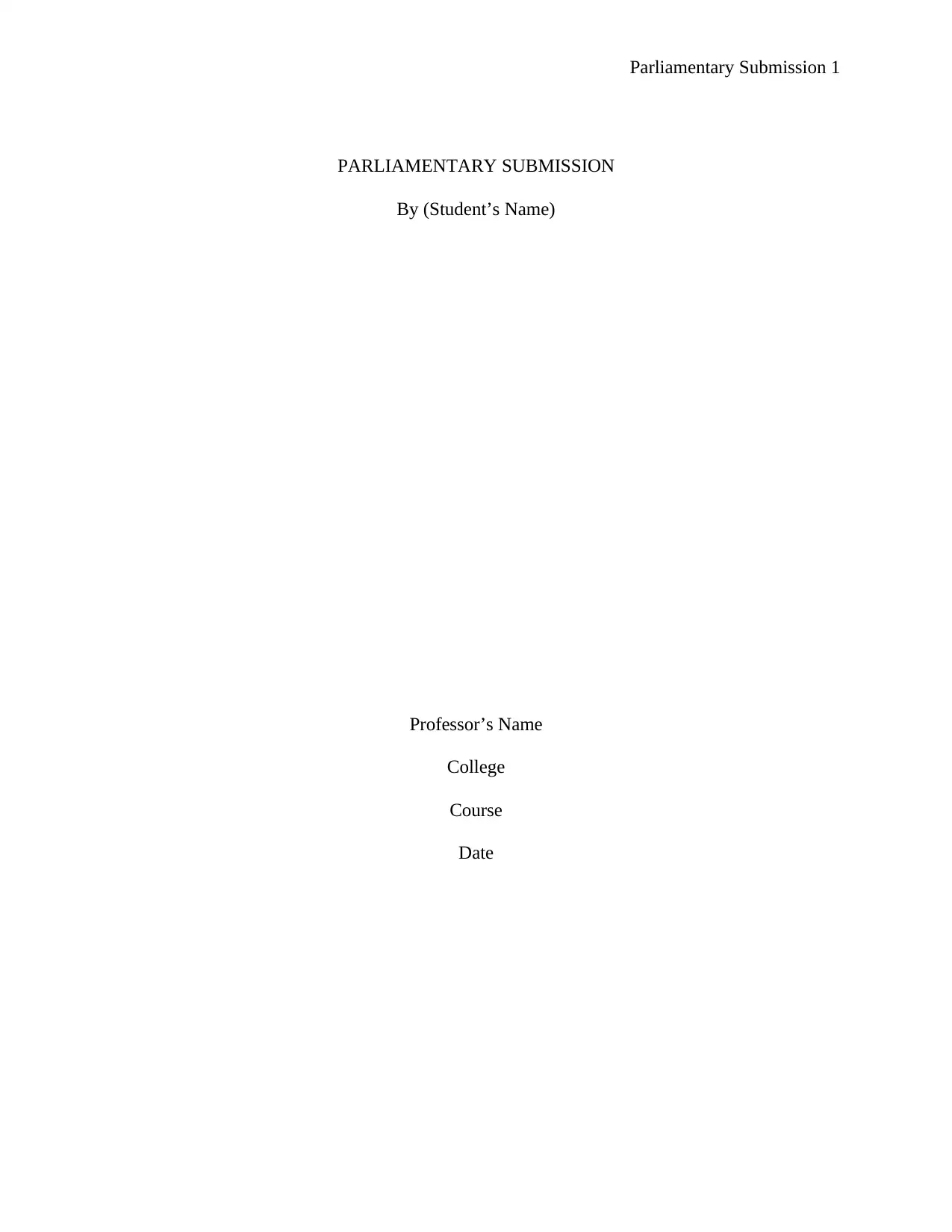
Parliamentary Submission 1
PARLIAMENTARY SUBMISSION
By (Student’s Name)
Professor’s Name
College
Course
Date
PARLIAMENTARY SUBMISSION
By (Student’s Name)
Professor’s Name
College
Course
Date
Secure Best Marks with AI Grader
Need help grading? Try our AI Grader for instant feedback on your assignments.
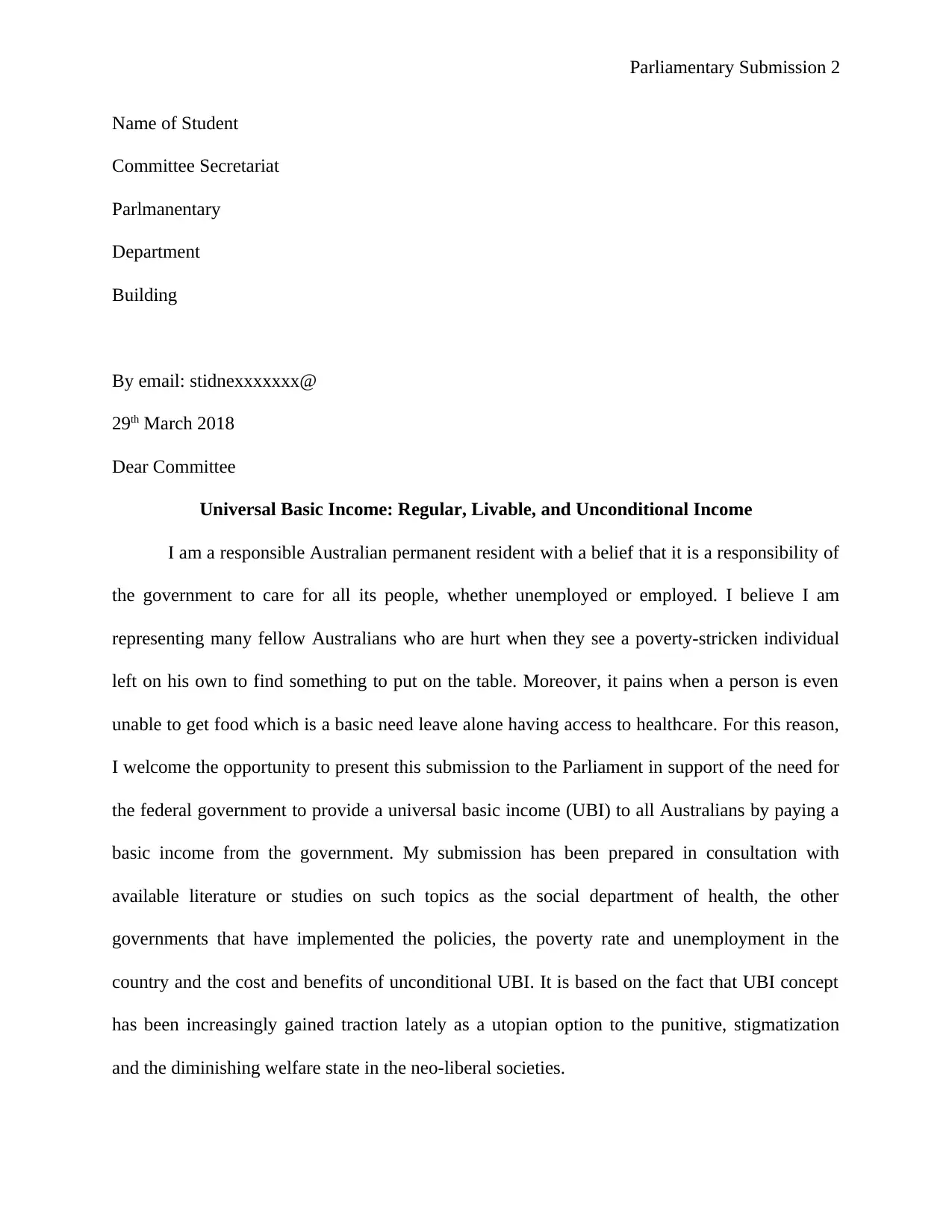
Parliamentary Submission 2
Name of Student
Committee Secretariat
Parlmanentary
Department
Building
By email: stidnexxxxxxx@
29th March 2018
Dear Committee
Universal Basic Income: Regular, Livable, and Unconditional Income
I am a responsible Australian permanent resident with a belief that it is a responsibility of
the government to care for all its people, whether unemployed or employed. I believe I am
representing many fellow Australians who are hurt when they see a poverty-stricken individual
left on his own to find something to put on the table. Moreover, it pains when a person is even
unable to get food which is a basic need leave alone having access to healthcare. For this reason,
I welcome the opportunity to present this submission to the Parliament in support of the need for
the federal government to provide a universal basic income (UBI) to all Australians by paying a
basic income from the government. My submission has been prepared in consultation with
available literature or studies on such topics as the social department of health, the other
governments that have implemented the policies, the poverty rate and unemployment in the
country and the cost and benefits of unconditional UBI. It is based on the fact that UBI concept
has been increasingly gained traction lately as a utopian option to the punitive, stigmatization
and the diminishing welfare state in the neo-liberal societies.
Name of Student
Committee Secretariat
Parlmanentary
Department
Building
By email: stidnexxxxxxx@
29th March 2018
Dear Committee
Universal Basic Income: Regular, Livable, and Unconditional Income
I am a responsible Australian permanent resident with a belief that it is a responsibility of
the government to care for all its people, whether unemployed or employed. I believe I am
representing many fellow Australians who are hurt when they see a poverty-stricken individual
left on his own to find something to put on the table. Moreover, it pains when a person is even
unable to get food which is a basic need leave alone having access to healthcare. For this reason,
I welcome the opportunity to present this submission to the Parliament in support of the need for
the federal government to provide a universal basic income (UBI) to all Australians by paying a
basic income from the government. My submission has been prepared in consultation with
available literature or studies on such topics as the social department of health, the other
governments that have implemented the policies, the poverty rate and unemployment in the
country and the cost and benefits of unconditional UBI. It is based on the fact that UBI concept
has been increasingly gained traction lately as a utopian option to the punitive, stigmatization
and the diminishing welfare state in the neo-liberal societies.
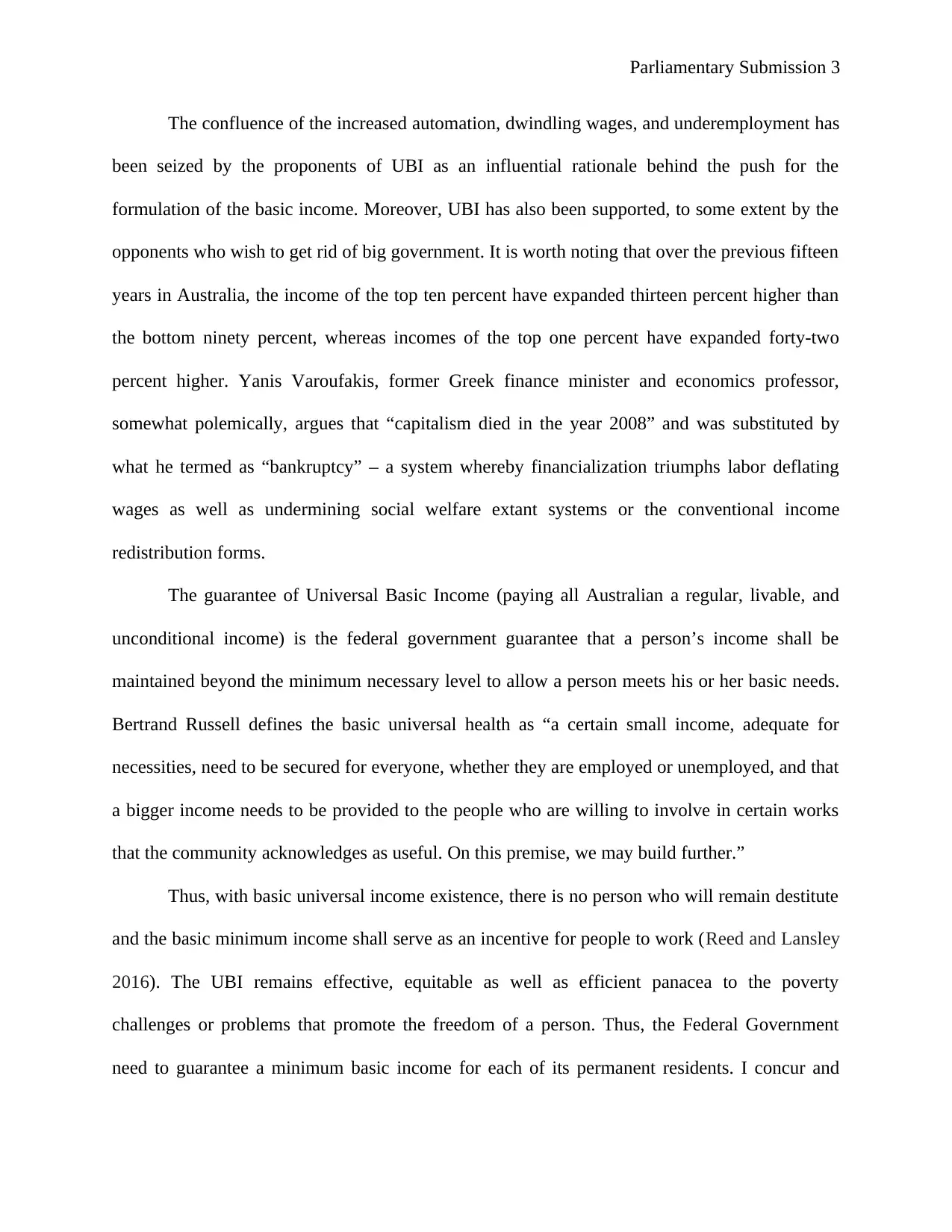
Parliamentary Submission 3
The confluence of the increased automation, dwindling wages, and underemployment has
been seized by the proponents of UBI as an influential rationale behind the push for the
formulation of the basic income. Moreover, UBI has also been supported, to some extent by the
opponents who wish to get rid of big government. It is worth noting that over the previous fifteen
years in Australia, the income of the top ten percent have expanded thirteen percent higher than
the bottom ninety percent, whereas incomes of the top one percent have expanded forty-two
percent higher. Yanis Varoufakis, former Greek finance minister and economics professor,
somewhat polemically, argues that “capitalism died in the year 2008” and was substituted by
what he termed as “bankruptcy” – a system whereby financialization triumphs labor deflating
wages as well as undermining social welfare extant systems or the conventional income
redistribution forms.
The guarantee of Universal Basic Income (paying all Australian a regular, livable, and
unconditional income) is the federal government guarantee that a person’s income shall be
maintained beyond the minimum necessary level to allow a person meets his or her basic needs.
Bertrand Russell defines the basic universal health as “a certain small income, adequate for
necessities, need to be secured for everyone, whether they are employed or unemployed, and that
a bigger income needs to be provided to the people who are willing to involve in certain works
that the community acknowledges as useful. On this premise, we may build further.”
Thus, with basic universal income existence, there is no person who will remain destitute
and the basic minimum income shall serve as an incentive for people to work (Reed and Lansley
2016). The UBI remains effective, equitable as well as efficient panacea to the poverty
challenges or problems that promote the freedom of a person. Thus, the Federal Government
need to guarantee a minimum basic income for each of its permanent residents. I concur and
The confluence of the increased automation, dwindling wages, and underemployment has
been seized by the proponents of UBI as an influential rationale behind the push for the
formulation of the basic income. Moreover, UBI has also been supported, to some extent by the
opponents who wish to get rid of big government. It is worth noting that over the previous fifteen
years in Australia, the income of the top ten percent have expanded thirteen percent higher than
the bottom ninety percent, whereas incomes of the top one percent have expanded forty-two
percent higher. Yanis Varoufakis, former Greek finance minister and economics professor,
somewhat polemically, argues that “capitalism died in the year 2008” and was substituted by
what he termed as “bankruptcy” – a system whereby financialization triumphs labor deflating
wages as well as undermining social welfare extant systems or the conventional income
redistribution forms.
The guarantee of Universal Basic Income (paying all Australian a regular, livable, and
unconditional income) is the federal government guarantee that a person’s income shall be
maintained beyond the minimum necessary level to allow a person meets his or her basic needs.
Bertrand Russell defines the basic universal health as “a certain small income, adequate for
necessities, need to be secured for everyone, whether they are employed or unemployed, and that
a bigger income needs to be provided to the people who are willing to involve in certain works
that the community acknowledges as useful. On this premise, we may build further.”
Thus, with basic universal income existence, there is no person who will remain destitute
and the basic minimum income shall serve as an incentive for people to work (Reed and Lansley
2016). The UBI remains effective, equitable as well as efficient panacea to the poverty
challenges or problems that promote the freedom of a person. Thus, the Federal Government
need to guarantee a minimum basic income for each of its permanent residents. I concur and
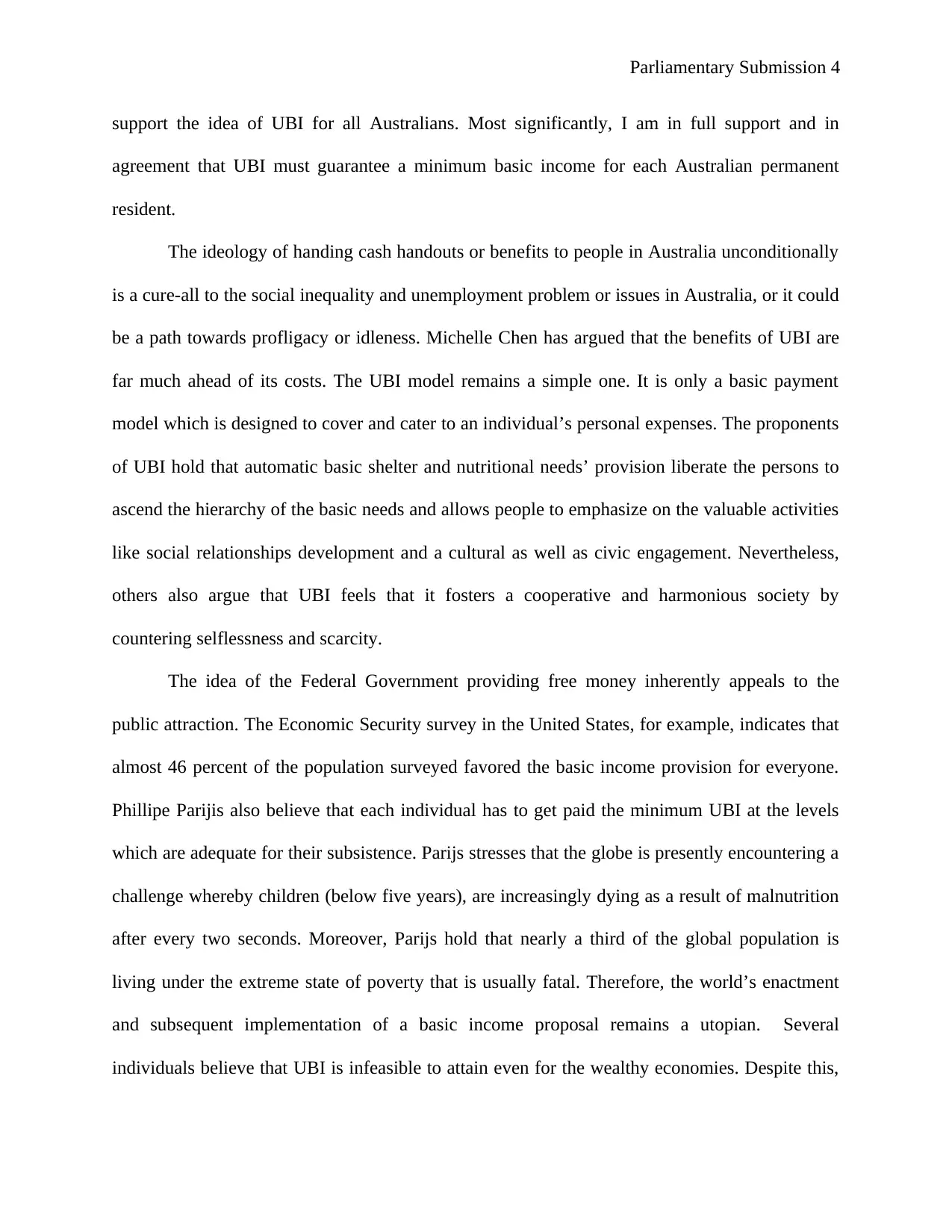
Parliamentary Submission 4
support the idea of UBI for all Australians. Most significantly, I am in full support and in
agreement that UBI must guarantee a minimum basic income for each Australian permanent
resident.
The ideology of handing cash handouts or benefits to people in Australia unconditionally
is a cure-all to the social inequality and unemployment problem or issues in Australia, or it could
be a path towards profligacy or idleness. Michelle Chen has argued that the benefits of UBI are
far much ahead of its costs. The UBI model remains a simple one. It is only a basic payment
model which is designed to cover and cater to an individual’s personal expenses. The proponents
of UBI hold that automatic basic shelter and nutritional needs’ provision liberate the persons to
ascend the hierarchy of the basic needs and allows people to emphasize on the valuable activities
like social relationships development and a cultural as well as civic engagement. Nevertheless,
others also argue that UBI feels that it fosters a cooperative and harmonious society by
countering selflessness and scarcity.
The idea of the Federal Government providing free money inherently appeals to the
public attraction. The Economic Security survey in the United States, for example, indicates that
almost 46 percent of the population surveyed favored the basic income provision for everyone.
Phillipe Parijis also believe that each individual has to get paid the minimum UBI at the levels
which are adequate for their subsistence. Parijs stresses that the globe is presently encountering a
challenge whereby children (below five years), are increasingly dying as a result of malnutrition
after every two seconds. Moreover, Parijs hold that nearly a third of the global population is
living under the extreme state of poverty that is usually fatal. Therefore, the world’s enactment
and subsequent implementation of a basic income proposal remains a utopian. Several
individuals believe that UBI is infeasible to attain even for the wealthy economies. Despite this,
support the idea of UBI for all Australians. Most significantly, I am in full support and in
agreement that UBI must guarantee a minimum basic income for each Australian permanent
resident.
The ideology of handing cash handouts or benefits to people in Australia unconditionally
is a cure-all to the social inequality and unemployment problem or issues in Australia, or it could
be a path towards profligacy or idleness. Michelle Chen has argued that the benefits of UBI are
far much ahead of its costs. The UBI model remains a simple one. It is only a basic payment
model which is designed to cover and cater to an individual’s personal expenses. The proponents
of UBI hold that automatic basic shelter and nutritional needs’ provision liberate the persons to
ascend the hierarchy of the basic needs and allows people to emphasize on the valuable activities
like social relationships development and a cultural as well as civic engagement. Nevertheless,
others also argue that UBI feels that it fosters a cooperative and harmonious society by
countering selflessness and scarcity.
The idea of the Federal Government providing free money inherently appeals to the
public attraction. The Economic Security survey in the United States, for example, indicates that
almost 46 percent of the population surveyed favored the basic income provision for everyone.
Phillipe Parijis also believe that each individual has to get paid the minimum UBI at the levels
which are adequate for their subsistence. Parijs stresses that the globe is presently encountering a
challenge whereby children (below five years), are increasingly dying as a result of malnutrition
after every two seconds. Moreover, Parijs hold that nearly a third of the global population is
living under the extreme state of poverty that is usually fatal. Therefore, the world’s enactment
and subsequent implementation of a basic income proposal remains a utopian. Several
individuals believe that UBI is infeasible to attain even for the wealthy economies. Despite this,
Secure Best Marks with AI Grader
Need help grading? Try our AI Grader for instant feedback on your assignments.
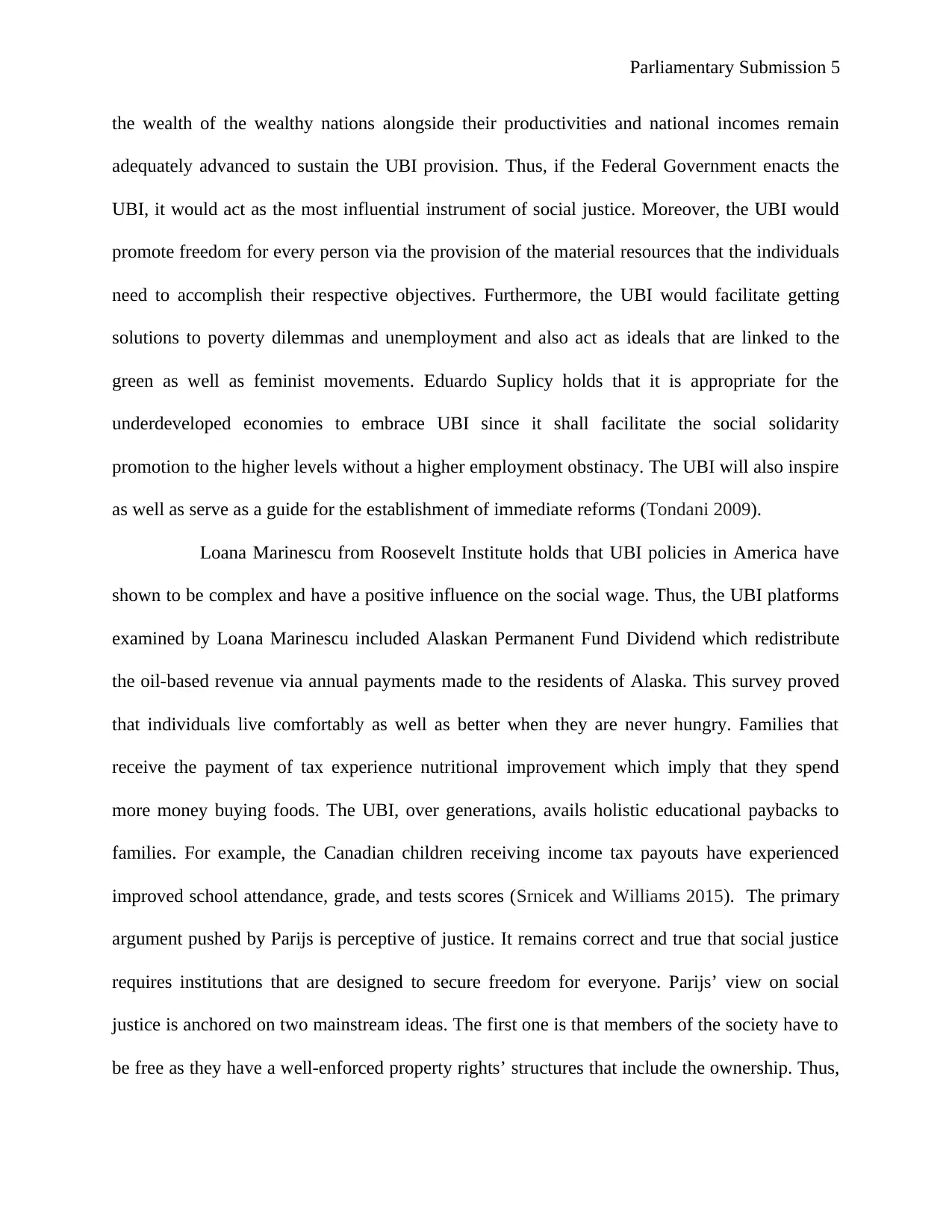
Parliamentary Submission 5
the wealth of the wealthy nations alongside their productivities and national incomes remain
adequately advanced to sustain the UBI provision. Thus, if the Federal Government enacts the
UBI, it would act as the most influential instrument of social justice. Moreover, the UBI would
promote freedom for every person via the provision of the material resources that the individuals
need to accomplish their respective objectives. Furthermore, the UBI would facilitate getting
solutions to poverty dilemmas and unemployment and also act as ideals that are linked to the
green as well as feminist movements. Eduardo Suplicy holds that it is appropriate for the
underdeveloped economies to embrace UBI since it shall facilitate the social solidarity
promotion to the higher levels without a higher employment obstinacy. The UBI will also inspire
as well as serve as a guide for the establishment of immediate reforms (Tondani 2009).
Loana Marinescu from Roosevelt Institute holds that UBI policies in America have
shown to be complex and have a positive influence on the social wage. Thus, the UBI platforms
examined by Loana Marinescu included Alaskan Permanent Fund Dividend which redistribute
the oil-based revenue via annual payments made to the residents of Alaska. This survey proved
that individuals live comfortably as well as better when they are never hungry. Families that
receive the payment of tax experience nutritional improvement which imply that they spend
more money buying foods. The UBI, over generations, avails holistic educational paybacks to
families. For example, the Canadian children receiving income tax payouts have experienced
improved school attendance, grade, and tests scores (Srnicek and Williams 2015). The primary
argument pushed by Parijs is perceptive of justice. It remains correct and true that social justice
requires institutions that are designed to secure freedom for everyone. Parijs’ view on social
justice is anchored on two mainstream ideas. The first one is that members of the society have to
be free as they have a well-enforced property rights’ structures that include the ownership. Thus,
the wealth of the wealthy nations alongside their productivities and national incomes remain
adequately advanced to sustain the UBI provision. Thus, if the Federal Government enacts the
UBI, it would act as the most influential instrument of social justice. Moreover, the UBI would
promote freedom for every person via the provision of the material resources that the individuals
need to accomplish their respective objectives. Furthermore, the UBI would facilitate getting
solutions to poverty dilemmas and unemployment and also act as ideals that are linked to the
green as well as feminist movements. Eduardo Suplicy holds that it is appropriate for the
underdeveloped economies to embrace UBI since it shall facilitate the social solidarity
promotion to the higher levels without a higher employment obstinacy. The UBI will also inspire
as well as serve as a guide for the establishment of immediate reforms (Tondani 2009).
Loana Marinescu from Roosevelt Institute holds that UBI policies in America have
shown to be complex and have a positive influence on the social wage. Thus, the UBI platforms
examined by Loana Marinescu included Alaskan Permanent Fund Dividend which redistribute
the oil-based revenue via annual payments made to the residents of Alaska. This survey proved
that individuals live comfortably as well as better when they are never hungry. Families that
receive the payment of tax experience nutritional improvement which imply that they spend
more money buying foods. The UBI, over generations, avails holistic educational paybacks to
families. For example, the Canadian children receiving income tax payouts have experienced
improved school attendance, grade, and tests scores (Srnicek and Williams 2015). The primary
argument pushed by Parijs is perceptive of justice. It remains correct and true that social justice
requires institutions that are designed to secure freedom for everyone. Parijs’ view on social
justice is anchored on two mainstream ideas. The first one is that members of the society have to
be free as they have a well-enforced property rights’ structures that include the ownership. Thus,
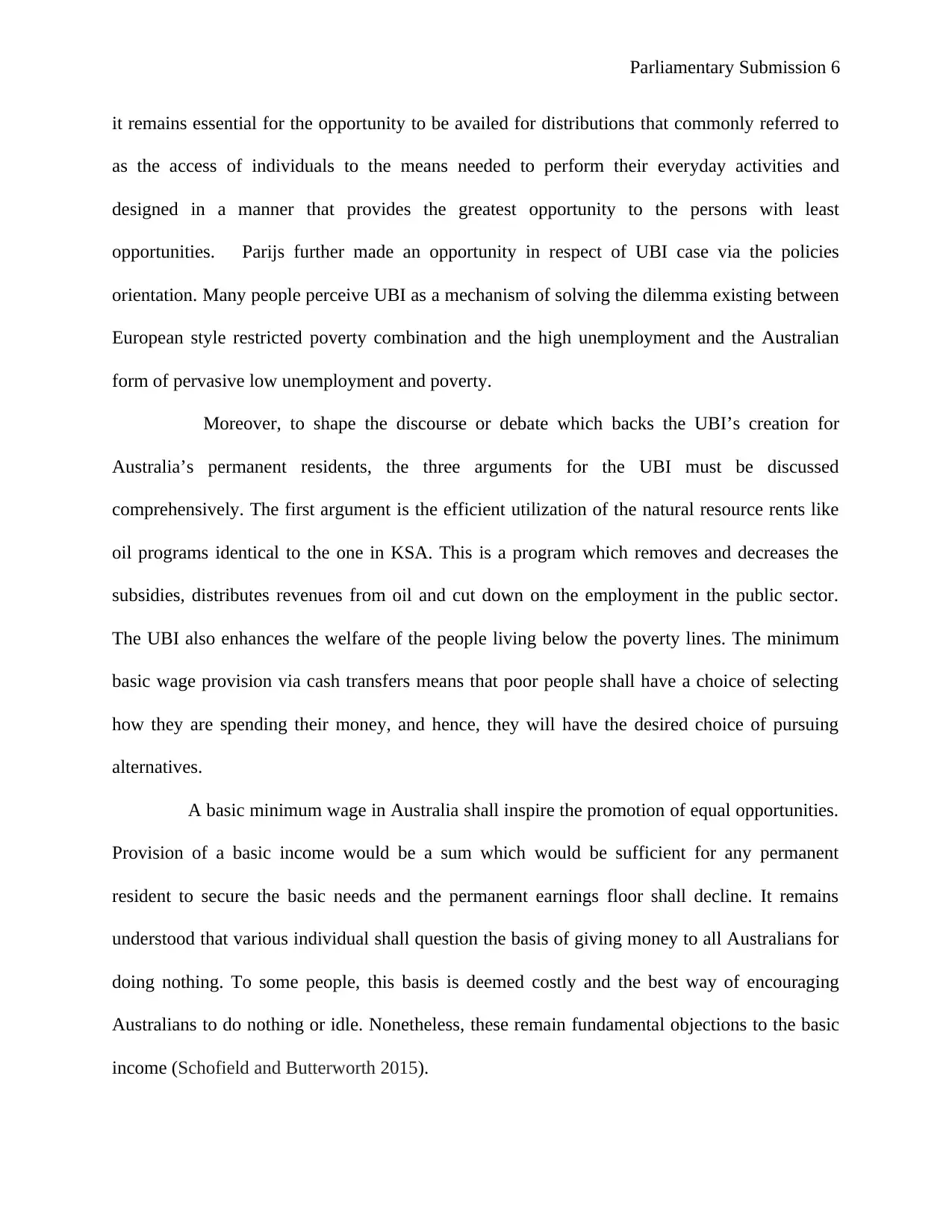
Parliamentary Submission 6
it remains essential for the opportunity to be availed for distributions that commonly referred to
as the access of individuals to the means needed to perform their everyday activities and
designed in a manner that provides the greatest opportunity to the persons with least
opportunities. Parijs further made an opportunity in respect of UBI case via the policies
orientation. Many people perceive UBI as a mechanism of solving the dilemma existing between
European style restricted poverty combination and the high unemployment and the Australian
form of pervasive low unemployment and poverty.
Moreover, to shape the discourse or debate which backs the UBI’s creation for
Australia’s permanent residents, the three arguments for the UBI must be discussed
comprehensively. The first argument is the efficient utilization of the natural resource rents like
oil programs identical to the one in KSA. This is a program which removes and decreases the
subsidies, distributes revenues from oil and cut down on the employment in the public sector.
The UBI also enhances the welfare of the people living below the poverty lines. The minimum
basic wage provision via cash transfers means that poor people shall have a choice of selecting
how they are spending their money, and hence, they will have the desired choice of pursuing
alternatives.
A basic minimum wage in Australia shall inspire the promotion of equal opportunities.
Provision of a basic income would be a sum which would be sufficient for any permanent
resident to secure the basic needs and the permanent earnings floor shall decline. It remains
understood that various individual shall question the basis of giving money to all Australians for
doing nothing. To some people, this basis is deemed costly and the best way of encouraging
Australians to do nothing or idle. Nonetheless, these remain fundamental objections to the basic
income (Schofield and Butterworth 2015).
it remains essential for the opportunity to be availed for distributions that commonly referred to
as the access of individuals to the means needed to perform their everyday activities and
designed in a manner that provides the greatest opportunity to the persons with least
opportunities. Parijs further made an opportunity in respect of UBI case via the policies
orientation. Many people perceive UBI as a mechanism of solving the dilemma existing between
European style restricted poverty combination and the high unemployment and the Australian
form of pervasive low unemployment and poverty.
Moreover, to shape the discourse or debate which backs the UBI’s creation for
Australia’s permanent residents, the three arguments for the UBI must be discussed
comprehensively. The first argument is the efficient utilization of the natural resource rents like
oil programs identical to the one in KSA. This is a program which removes and decreases the
subsidies, distributes revenues from oil and cut down on the employment in the public sector.
The UBI also enhances the welfare of the people living below the poverty lines. The minimum
basic wage provision via cash transfers means that poor people shall have a choice of selecting
how they are spending their money, and hence, they will have the desired choice of pursuing
alternatives.
A basic minimum wage in Australia shall inspire the promotion of equal opportunities.
Provision of a basic income would be a sum which would be sufficient for any permanent
resident to secure the basic needs and the permanent earnings floor shall decline. It remains
understood that various individual shall question the basis of giving money to all Australians for
doing nothing. To some people, this basis is deemed costly and the best way of encouraging
Australians to do nothing or idle. Nonetheless, these remain fundamental objections to the basic
income (Schofield and Butterworth 2015).
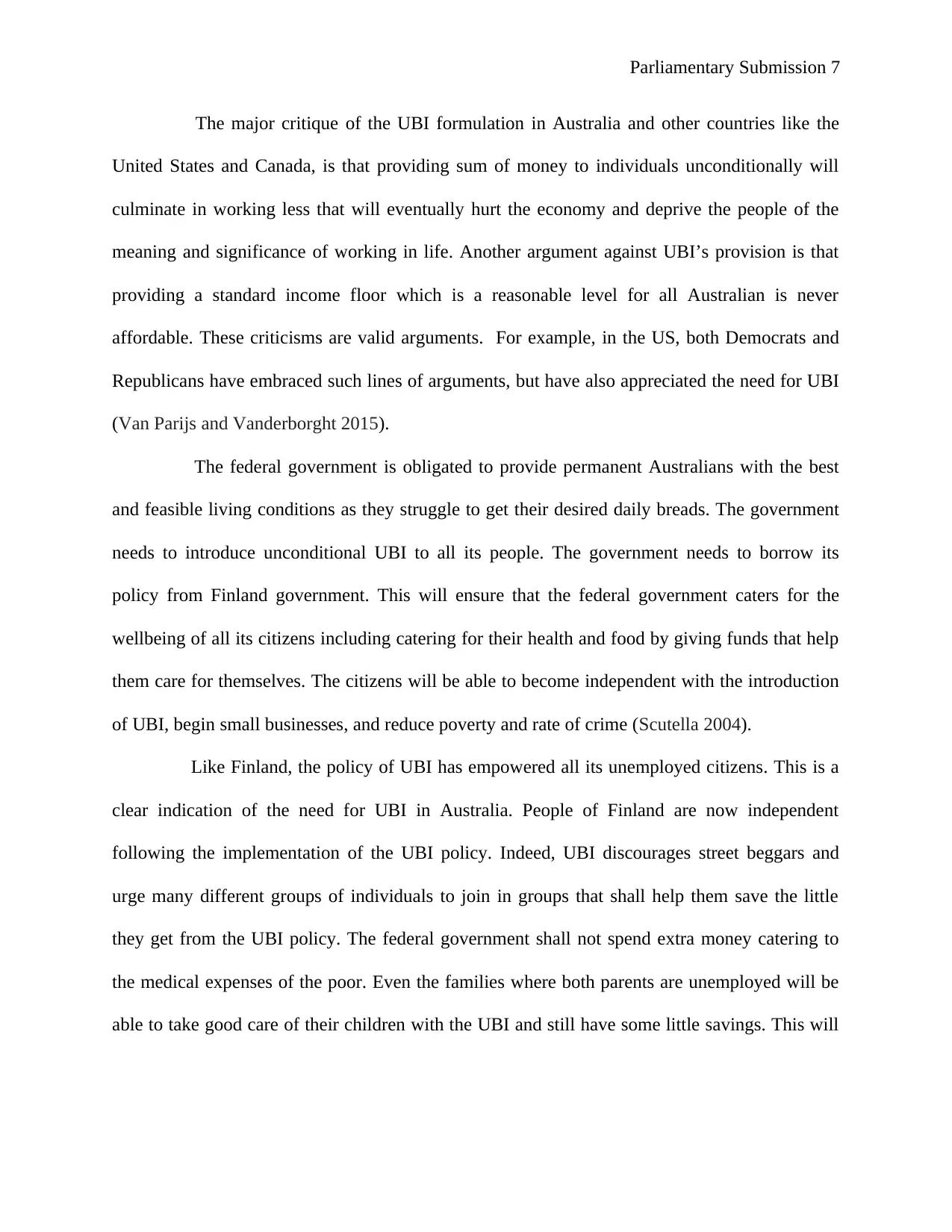
Parliamentary Submission 7
The major critique of the UBI formulation in Australia and other countries like the
United States and Canada, is that providing sum of money to individuals unconditionally will
culminate in working less that will eventually hurt the economy and deprive the people of the
meaning and significance of working in life. Another argument against UBI’s provision is that
providing a standard income floor which is a reasonable level for all Australian is never
affordable. These criticisms are valid arguments. For example, in the US, both Democrats and
Republicans have embraced such lines of arguments, but have also appreciated the need for UBI
(Van Parijs and Vanderborght 2015).
The federal government is obligated to provide permanent Australians with the best
and feasible living conditions as they struggle to get their desired daily breads. The government
needs to introduce unconditional UBI to all its people. The government needs to borrow its
policy from Finland government. This will ensure that the federal government caters for the
wellbeing of all its citizens including catering for their health and food by giving funds that help
them care for themselves. The citizens will be able to become independent with the introduction
of UBI, begin small businesses, and reduce poverty and rate of crime (Scutella 2004).
Like Finland, the policy of UBI has empowered all its unemployed citizens. This is a
clear indication of the need for UBI in Australia. People of Finland are now independent
following the implementation of the UBI policy. Indeed, UBI discourages street beggars and
urge many different groups of individuals to join in groups that shall help them save the little
they get from the UBI policy. The federal government shall not spend extra money catering to
the medical expenses of the poor. Even the families where both parents are unemployed will be
able to take good care of their children with the UBI and still have some little savings. This will
The major critique of the UBI formulation in Australia and other countries like the
United States and Canada, is that providing sum of money to individuals unconditionally will
culminate in working less that will eventually hurt the economy and deprive the people of the
meaning and significance of working in life. Another argument against UBI’s provision is that
providing a standard income floor which is a reasonable level for all Australian is never
affordable. These criticisms are valid arguments. For example, in the US, both Democrats and
Republicans have embraced such lines of arguments, but have also appreciated the need for UBI
(Van Parijs and Vanderborght 2015).
The federal government is obligated to provide permanent Australians with the best
and feasible living conditions as they struggle to get their desired daily breads. The government
needs to introduce unconditional UBI to all its people. The government needs to borrow its
policy from Finland government. This will ensure that the federal government caters for the
wellbeing of all its citizens including catering for their health and food by giving funds that help
them care for themselves. The citizens will be able to become independent with the introduction
of UBI, begin small businesses, and reduce poverty and rate of crime (Scutella 2004).
Like Finland, the policy of UBI has empowered all its unemployed citizens. This is a
clear indication of the need for UBI in Australia. People of Finland are now independent
following the implementation of the UBI policy. Indeed, UBI discourages street beggars and
urge many different groups of individuals to join in groups that shall help them save the little
they get from the UBI policy. The federal government shall not spend extra money catering to
the medical expenses of the poor. Even the families where both parents are unemployed will be
able to take good care of their children with the UBI and still have some little savings. This will
Paraphrase This Document
Need a fresh take? Get an instant paraphrase of this document with our AI Paraphraser
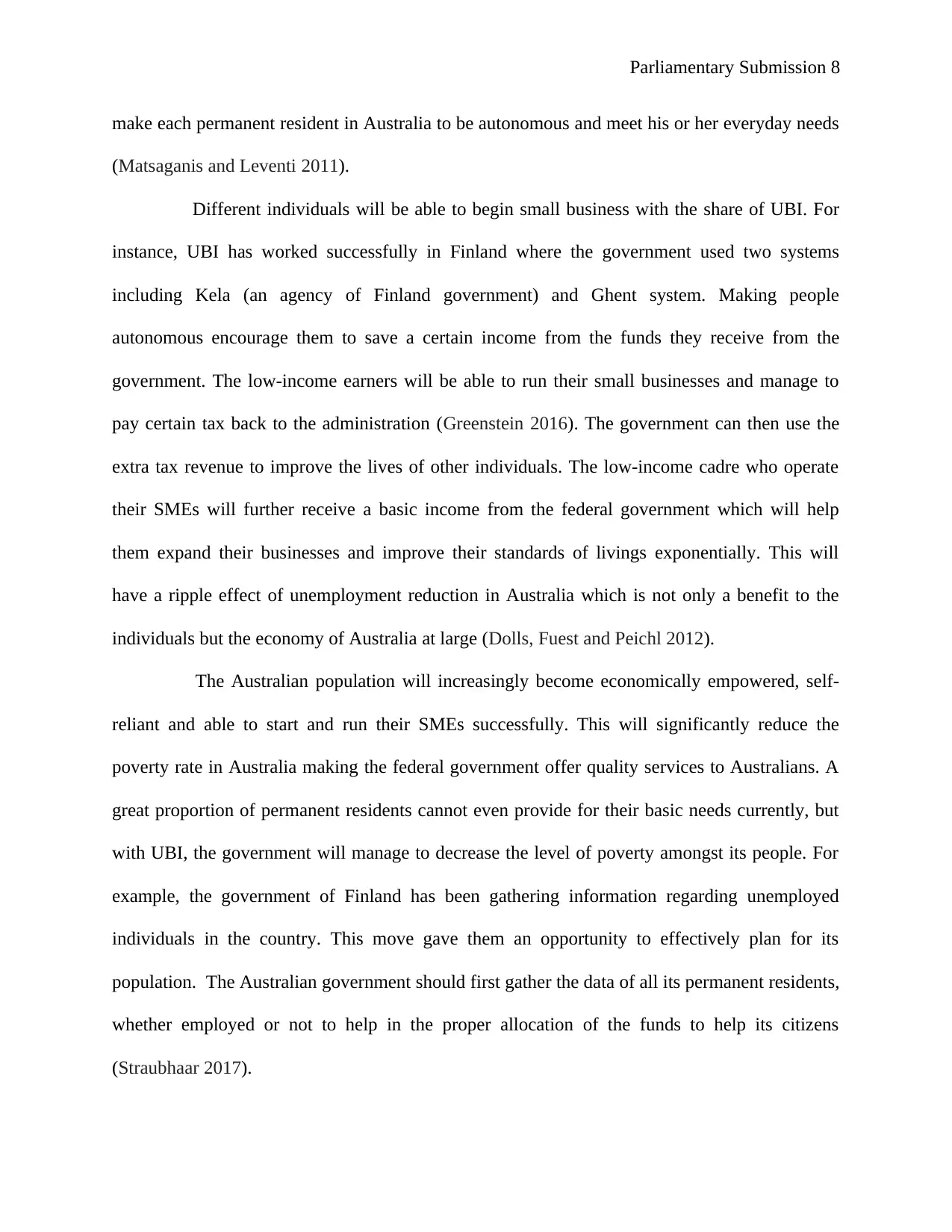
Parliamentary Submission 8
make each permanent resident in Australia to be autonomous and meet his or her everyday needs
(Matsaganis and Leventi 2011).
Different individuals will be able to begin small business with the share of UBI. For
instance, UBI has worked successfully in Finland where the government used two systems
including Kela (an agency of Finland government) and Ghent system. Making people
autonomous encourage them to save a certain income from the funds they receive from the
government. The low-income earners will be able to run their small businesses and manage to
pay certain tax back to the administration (Greenstein 2016). The government can then use the
extra tax revenue to improve the lives of other individuals. The low-income cadre who operate
their SMEs will further receive a basic income from the federal government which will help
them expand their businesses and improve their standards of livings exponentially. This will
have a ripple effect of unemployment reduction in Australia which is not only a benefit to the
individuals but the economy of Australia at large (Dolls, Fuest and Peichl 2012).
The Australian population will increasingly become economically empowered, self-
reliant and able to start and run their SMEs successfully. This will significantly reduce the
poverty rate in Australia making the federal government offer quality services to Australians. A
great proportion of permanent residents cannot even provide for their basic needs currently, but
with UBI, the government will manage to decrease the level of poverty amongst its people. For
example, the government of Finland has been gathering information regarding unemployed
individuals in the country. This move gave them an opportunity to effectively plan for its
population. The Australian government should first gather the data of all its permanent residents,
whether employed or not to help in the proper allocation of the funds to help its citizens
(Straubhaar 2017).
make each permanent resident in Australia to be autonomous and meet his or her everyday needs
(Matsaganis and Leventi 2011).
Different individuals will be able to begin small business with the share of UBI. For
instance, UBI has worked successfully in Finland where the government used two systems
including Kela (an agency of Finland government) and Ghent system. Making people
autonomous encourage them to save a certain income from the funds they receive from the
government. The low-income earners will be able to run their small businesses and manage to
pay certain tax back to the administration (Greenstein 2016). The government can then use the
extra tax revenue to improve the lives of other individuals. The low-income cadre who operate
their SMEs will further receive a basic income from the federal government which will help
them expand their businesses and improve their standards of livings exponentially. This will
have a ripple effect of unemployment reduction in Australia which is not only a benefit to the
individuals but the economy of Australia at large (Dolls, Fuest and Peichl 2012).
The Australian population will increasingly become economically empowered, self-
reliant and able to start and run their SMEs successfully. This will significantly reduce the
poverty rate in Australia making the federal government offer quality services to Australians. A
great proportion of permanent residents cannot even provide for their basic needs currently, but
with UBI, the government will manage to decrease the level of poverty amongst its people. For
example, the government of Finland has been gathering information regarding unemployed
individuals in the country. This move gave them an opportunity to effectively plan for its
population. The Australian government should first gather the data of all its permanent residents,
whether employed or not to help in the proper allocation of the funds to help its citizens
(Straubhaar 2017).
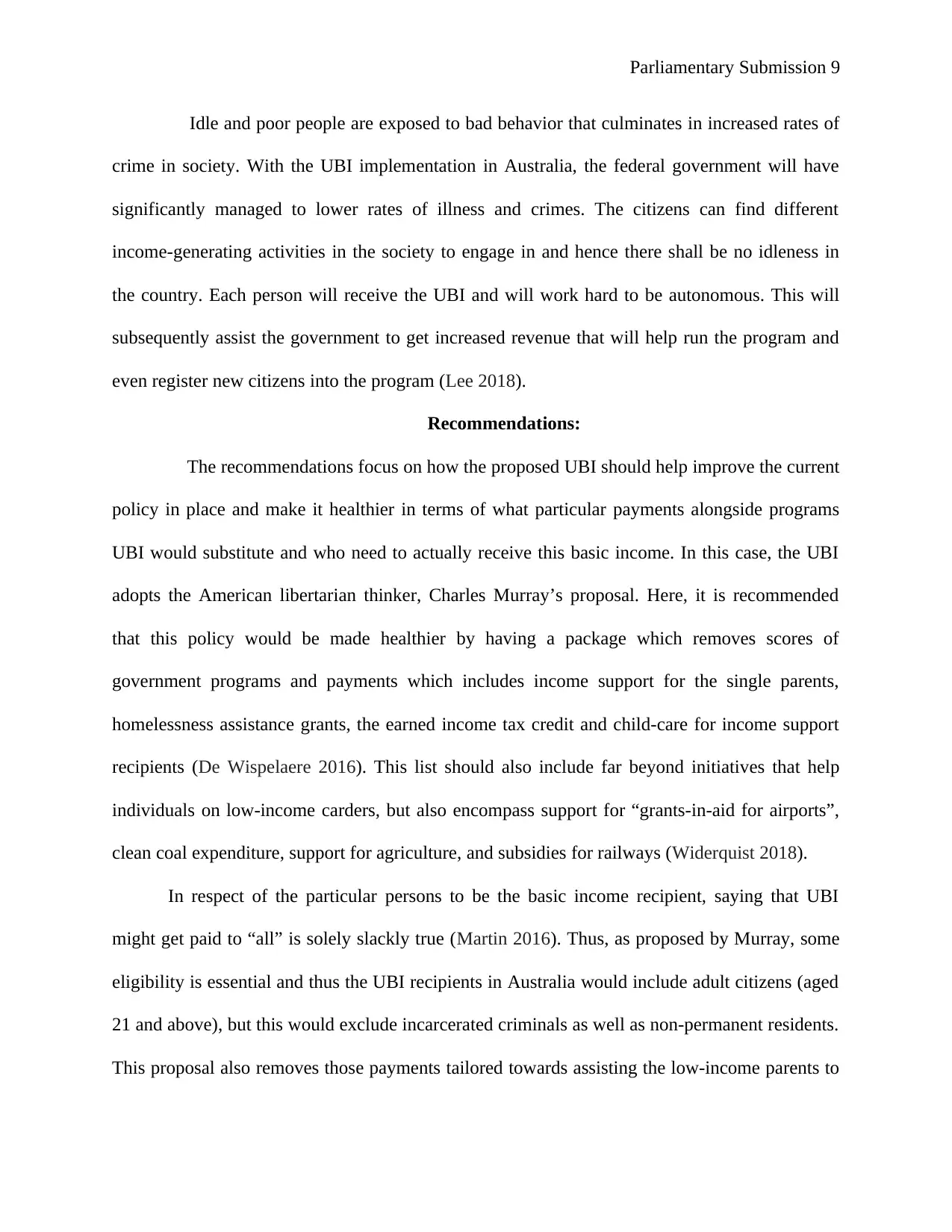
Parliamentary Submission 9
Idle and poor people are exposed to bad behavior that culminates in increased rates of
crime in society. With the UBI implementation in Australia, the federal government will have
significantly managed to lower rates of illness and crimes. The citizens can find different
income-generating activities in the society to engage in and hence there shall be no idleness in
the country. Each person will receive the UBI and will work hard to be autonomous. This will
subsequently assist the government to get increased revenue that will help run the program and
even register new citizens into the program (Lee 2018).
Recommendations:
The recommendations focus on how the proposed UBI should help improve the current
policy in place and make it healthier in terms of what particular payments alongside programs
UBI would substitute and who need to actually receive this basic income. In this case, the UBI
adopts the American libertarian thinker, Charles Murray’s proposal. Here, it is recommended
that this policy would be made healthier by having a package which removes scores of
government programs and payments which includes income support for the single parents,
homelessness assistance grants, the earned income tax credit and child-care for income support
recipients (De Wispelaere 2016). This list should also include far beyond initiatives that help
individuals on low-income carders, but also encompass support for “grants-in-aid for airports”,
clean coal expenditure, support for agriculture, and subsidies for railways (Widerquist 2018).
In respect of the particular persons to be the basic income recipient, saying that UBI
might get paid to “all” is solely slackly true (Martin 2016). Thus, as proposed by Murray, some
eligibility is essential and thus the UBI recipients in Australia would include adult citizens (aged
21 and above), but this would exclude incarcerated criminals as well as non-permanent residents.
This proposal also removes those payments tailored towards assisting the low-income parents to
Idle and poor people are exposed to bad behavior that culminates in increased rates of
crime in society. With the UBI implementation in Australia, the federal government will have
significantly managed to lower rates of illness and crimes. The citizens can find different
income-generating activities in the society to engage in and hence there shall be no idleness in
the country. Each person will receive the UBI and will work hard to be autonomous. This will
subsequently assist the government to get increased revenue that will help run the program and
even register new citizens into the program (Lee 2018).
Recommendations:
The recommendations focus on how the proposed UBI should help improve the current
policy in place and make it healthier in terms of what particular payments alongside programs
UBI would substitute and who need to actually receive this basic income. In this case, the UBI
adopts the American libertarian thinker, Charles Murray’s proposal. Here, it is recommended
that this policy would be made healthier by having a package which removes scores of
government programs and payments which includes income support for the single parents,
homelessness assistance grants, the earned income tax credit and child-care for income support
recipients (De Wispelaere 2016). This list should also include far beyond initiatives that help
individuals on low-income carders, but also encompass support for “grants-in-aid for airports”,
clean coal expenditure, support for agriculture, and subsidies for railways (Widerquist 2018).
In respect of the particular persons to be the basic income recipient, saying that UBI
might get paid to “all” is solely slackly true (Martin 2016). Thus, as proposed by Murray, some
eligibility is essential and thus the UBI recipients in Australia would include adult citizens (aged
21 and above), but this would exclude incarcerated criminals as well as non-permanent residents.
This proposal also removes those payments tailored towards assisting the low-income parents to
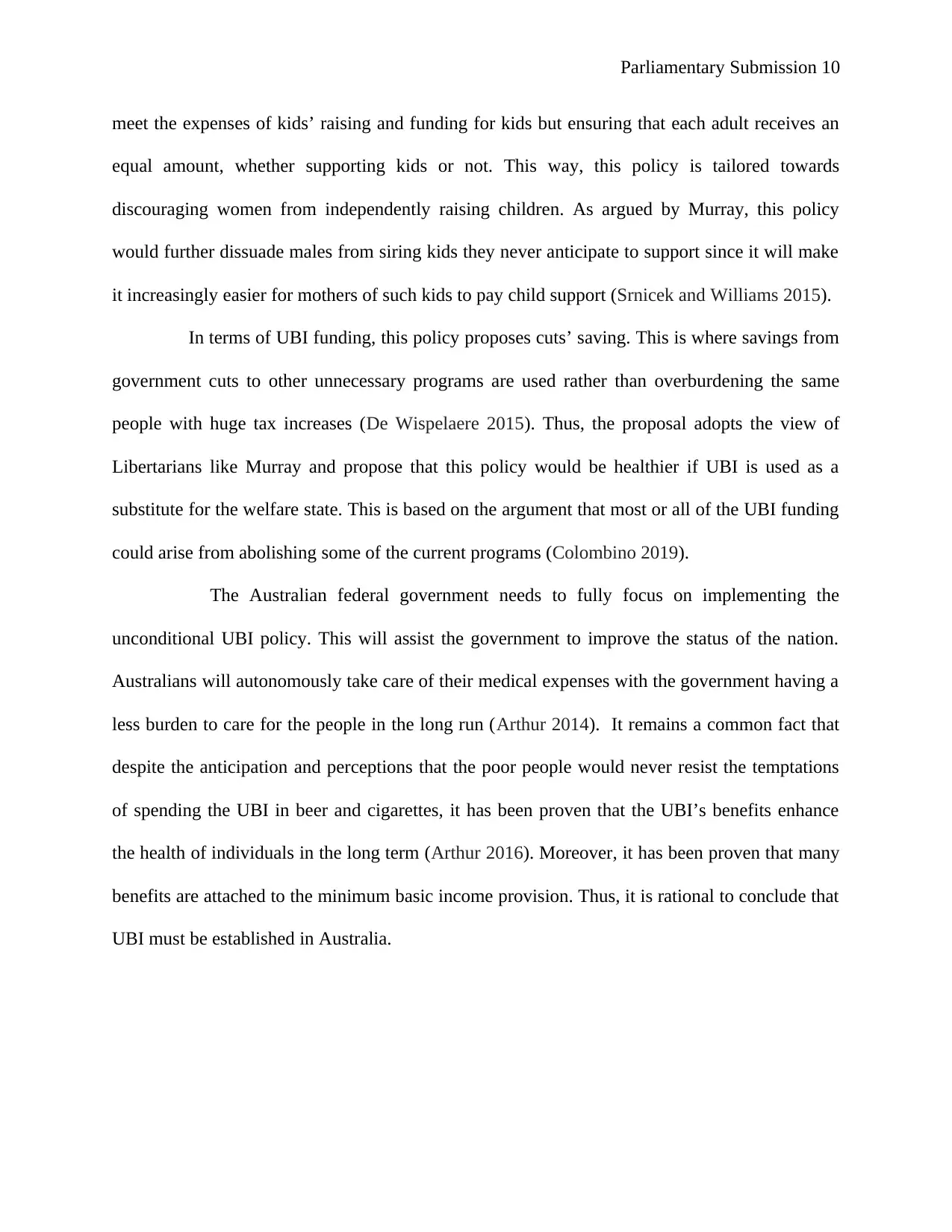
Parliamentary Submission 10
meet the expenses of kids’ raising and funding for kids but ensuring that each adult receives an
equal amount, whether supporting kids or not. This way, this policy is tailored towards
discouraging women from independently raising children. As argued by Murray, this policy
would further dissuade males from siring kids they never anticipate to support since it will make
it increasingly easier for mothers of such kids to pay child support (Srnicek and Williams 2015).
In terms of UBI funding, this policy proposes cuts’ saving. This is where savings from
government cuts to other unnecessary programs are used rather than overburdening the same
people with huge tax increases (De Wispelaere 2015). Thus, the proposal adopts the view of
Libertarians like Murray and propose that this policy would be healthier if UBI is used as a
substitute for the welfare state. This is based on the argument that most or all of the UBI funding
could arise from abolishing some of the current programs (Colombino 2019).
The Australian federal government needs to fully focus on implementing the
unconditional UBI policy. This will assist the government to improve the status of the nation.
Australians will autonomously take care of their medical expenses with the government having a
less burden to care for the people in the long run (Arthur 2014). It remains a common fact that
despite the anticipation and perceptions that the poor people would never resist the temptations
of spending the UBI in beer and cigarettes, it has been proven that the UBI’s benefits enhance
the health of individuals in the long term (Arthur 2016). Moreover, it has been proven that many
benefits are attached to the minimum basic income provision. Thus, it is rational to conclude that
UBI must be established in Australia.
meet the expenses of kids’ raising and funding for kids but ensuring that each adult receives an
equal amount, whether supporting kids or not. This way, this policy is tailored towards
discouraging women from independently raising children. As argued by Murray, this policy
would further dissuade males from siring kids they never anticipate to support since it will make
it increasingly easier for mothers of such kids to pay child support (Srnicek and Williams 2015).
In terms of UBI funding, this policy proposes cuts’ saving. This is where savings from
government cuts to other unnecessary programs are used rather than overburdening the same
people with huge tax increases (De Wispelaere 2015). Thus, the proposal adopts the view of
Libertarians like Murray and propose that this policy would be healthier if UBI is used as a
substitute for the welfare state. This is based on the argument that most or all of the UBI funding
could arise from abolishing some of the current programs (Colombino 2019).
The Australian federal government needs to fully focus on implementing the
unconditional UBI policy. This will assist the government to improve the status of the nation.
Australians will autonomously take care of their medical expenses with the government having a
less burden to care for the people in the long run (Arthur 2014). It remains a common fact that
despite the anticipation and perceptions that the poor people would never resist the temptations
of spending the UBI in beer and cigarettes, it has been proven that the UBI’s benefits enhance
the health of individuals in the long term (Arthur 2016). Moreover, it has been proven that many
benefits are attached to the minimum basic income provision. Thus, it is rational to conclude that
UBI must be established in Australia.
Secure Best Marks with AI Grader
Need help grading? Try our AI Grader for instant feedback on your assignments.
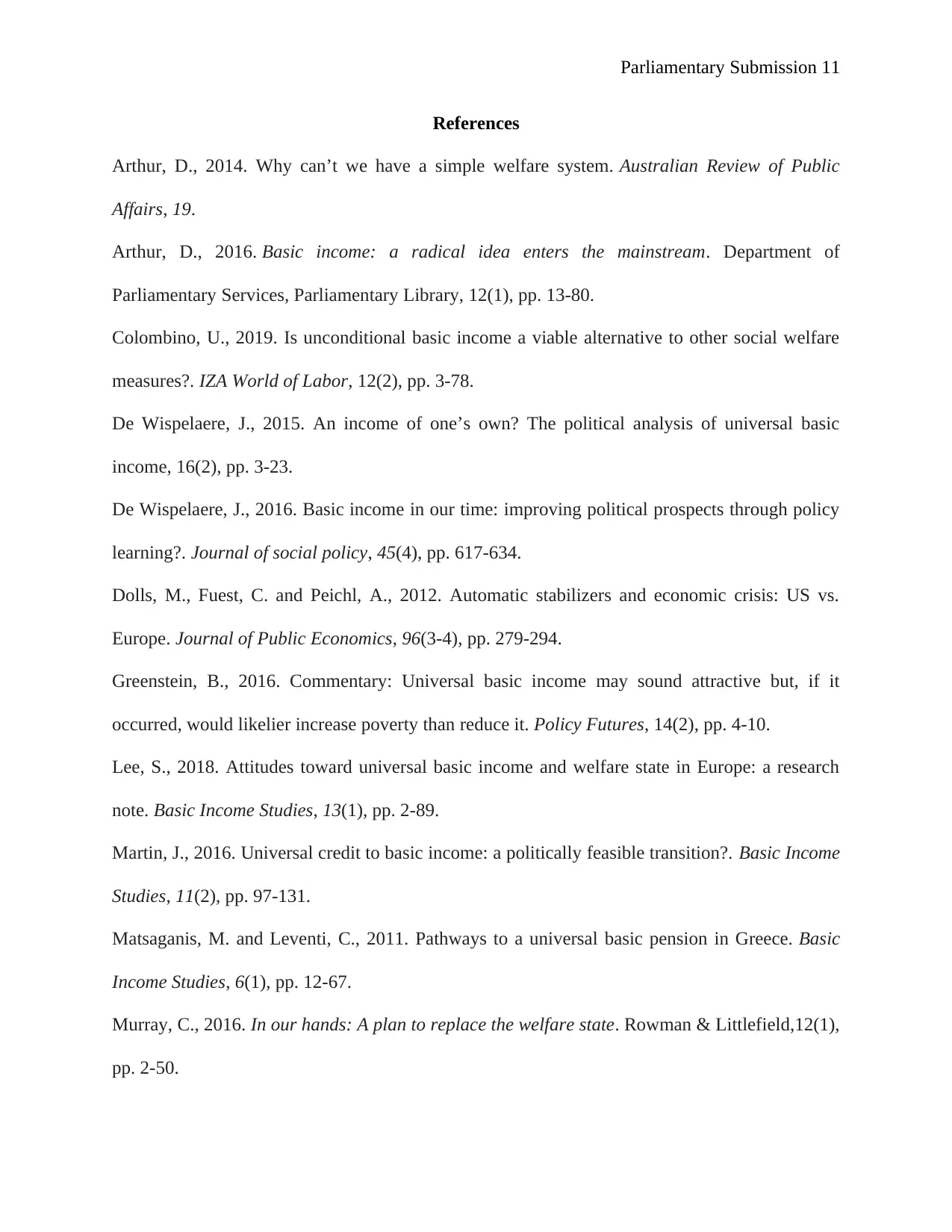
Parliamentary Submission 11
References
Arthur, D., 2014. Why can’t we have a simple welfare system. Australian Review of Public
Affairs, 19.
Arthur, D., 2016. Basic income: a radical idea enters the mainstream. Department of
Parliamentary Services, Parliamentary Library, 12(1), pp. 13-80.
Colombino, U., 2019. Is unconditional basic income a viable alternative to other social welfare
measures?. IZA World of Labor, 12(2), pp. 3-78.
De Wispelaere, J., 2015. An income of one’s own? The political analysis of universal basic
income, 16(2), pp. 3-23.
De Wispelaere, J., 2016. Basic income in our time: improving political prospects through policy
learning?. Journal of social policy, 45(4), pp. 617-634.
Dolls, M., Fuest, C. and Peichl, A., 2012. Automatic stabilizers and economic crisis: US vs.
Europe. Journal of Public Economics, 96(3-4), pp. 279-294.
Greenstein, B., 2016. Commentary: Universal basic income may sound attractive but, if it
occurred, would likelier increase poverty than reduce it. Policy Futures, 14(2), pp. 4-10.
Lee, S., 2018. Attitudes toward universal basic income and welfare state in Europe: a research
note. Basic Income Studies, 13(1), pp. 2-89.
Martin, J., 2016. Universal credit to basic income: a politically feasible transition?. Basic Income
Studies, 11(2), pp. 97-131.
Matsaganis, M. and Leventi, C., 2011. Pathways to a universal basic pension in Greece. Basic
Income Studies, 6(1), pp. 12-67.
Murray, C., 2016. In our hands: A plan to replace the welfare state. Rowman & Littlefield,12(1),
pp. 2-50.
References
Arthur, D., 2014. Why can’t we have a simple welfare system. Australian Review of Public
Affairs, 19.
Arthur, D., 2016. Basic income: a radical idea enters the mainstream. Department of
Parliamentary Services, Parliamentary Library, 12(1), pp. 13-80.
Colombino, U., 2019. Is unconditional basic income a viable alternative to other social welfare
measures?. IZA World of Labor, 12(2), pp. 3-78.
De Wispelaere, J., 2015. An income of one’s own? The political analysis of universal basic
income, 16(2), pp. 3-23.
De Wispelaere, J., 2016. Basic income in our time: improving political prospects through policy
learning?. Journal of social policy, 45(4), pp. 617-634.
Dolls, M., Fuest, C. and Peichl, A., 2012. Automatic stabilizers and economic crisis: US vs.
Europe. Journal of Public Economics, 96(3-4), pp. 279-294.
Greenstein, B., 2016. Commentary: Universal basic income may sound attractive but, if it
occurred, would likelier increase poverty than reduce it. Policy Futures, 14(2), pp. 4-10.
Lee, S., 2018. Attitudes toward universal basic income and welfare state in Europe: a research
note. Basic Income Studies, 13(1), pp. 2-89.
Martin, J., 2016. Universal credit to basic income: a politically feasible transition?. Basic Income
Studies, 11(2), pp. 97-131.
Matsaganis, M. and Leventi, C., 2011. Pathways to a universal basic pension in Greece. Basic
Income Studies, 6(1), pp. 12-67.
Murray, C., 2016. In our hands: A plan to replace the welfare state. Rowman & Littlefield,12(1),
pp. 2-50.
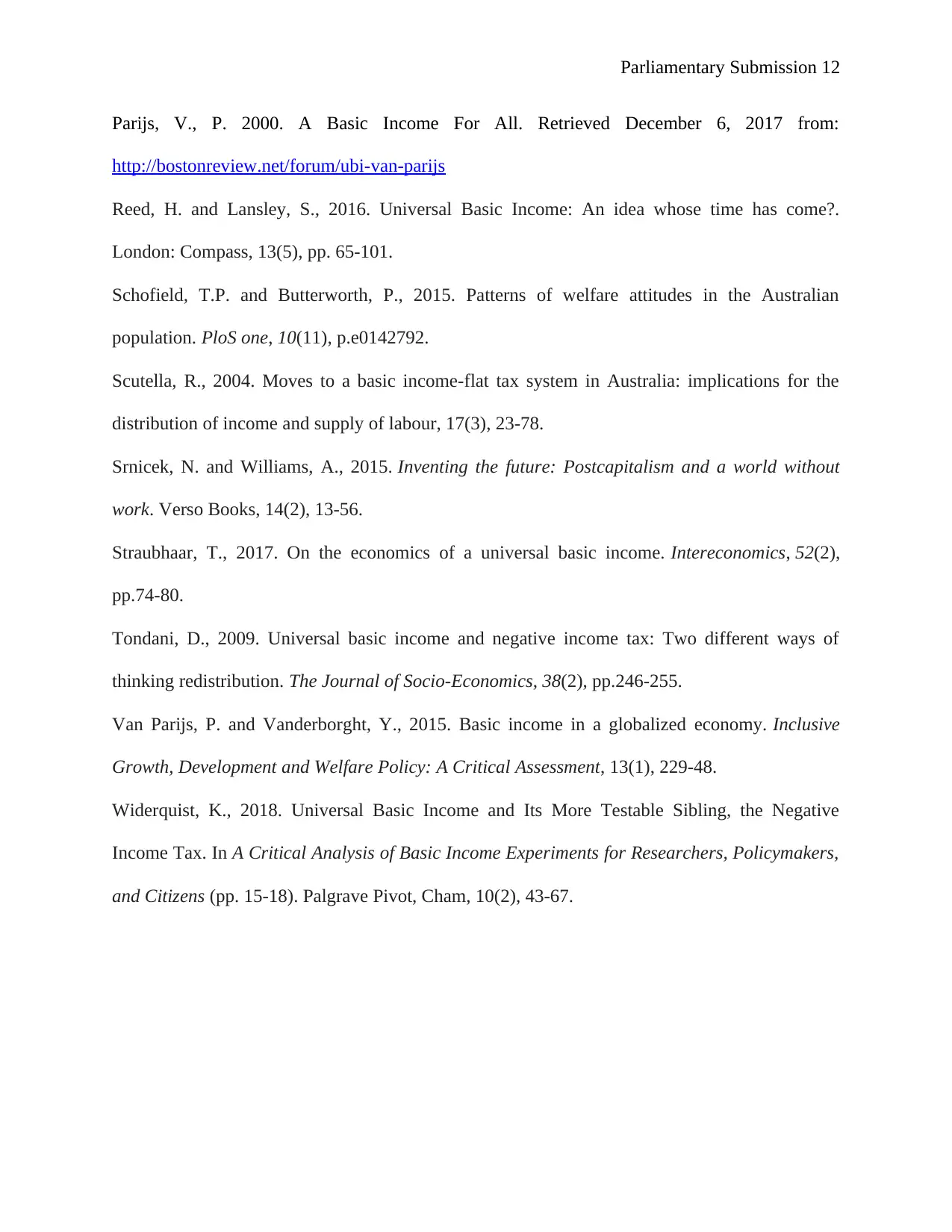
Parliamentary Submission 12
Parijs, V., P. 2000. A Basic Income For All. Retrieved December 6, 2017 from:
http://bostonreview.net/forum/ubi-van-parijs
Reed, H. and Lansley, S., 2016. Universal Basic Income: An idea whose time has come?.
London: Compass, 13(5), pp. 65-101.
Schofield, T.P. and Butterworth, P., 2015. Patterns of welfare attitudes in the Australian
population. PloS one, 10(11), p.e0142792.
Scutella, R., 2004. Moves to a basic income-flat tax system in Australia: implications for the
distribution of income and supply of labour, 17(3), 23-78.
Srnicek, N. and Williams, A., 2015. Inventing the future: Postcapitalism and a world without
work. Verso Books, 14(2), 13-56.
Straubhaar, T., 2017. On the economics of a universal basic income. Intereconomics, 52(2),
pp.74-80.
Tondani, D., 2009. Universal basic income and negative income tax: Two different ways of
thinking redistribution. The Journal of Socio-Economics, 38(2), pp.246-255.
Van Parijs, P. and Vanderborght, Y., 2015. Basic income in a globalized economy. Inclusive
Growth, Development and Welfare Policy: A Critical Assessment, 13(1), 229-48.
Widerquist, K., 2018. Universal Basic Income and Its More Testable Sibling, the Negative
Income Tax. In A Critical Analysis of Basic Income Experiments for Researchers, Policymakers,
and Citizens (pp. 15-18). Palgrave Pivot, Cham, 10(2), 43-67.
Parijs, V., P. 2000. A Basic Income For All. Retrieved December 6, 2017 from:
http://bostonreview.net/forum/ubi-van-parijs
Reed, H. and Lansley, S., 2016. Universal Basic Income: An idea whose time has come?.
London: Compass, 13(5), pp. 65-101.
Schofield, T.P. and Butterworth, P., 2015. Patterns of welfare attitudes in the Australian
population. PloS one, 10(11), p.e0142792.
Scutella, R., 2004. Moves to a basic income-flat tax system in Australia: implications for the
distribution of income and supply of labour, 17(3), 23-78.
Srnicek, N. and Williams, A., 2015. Inventing the future: Postcapitalism and a world without
work. Verso Books, 14(2), 13-56.
Straubhaar, T., 2017. On the economics of a universal basic income. Intereconomics, 52(2),
pp.74-80.
Tondani, D., 2009. Universal basic income and negative income tax: Two different ways of
thinking redistribution. The Journal of Socio-Economics, 38(2), pp.246-255.
Van Parijs, P. and Vanderborght, Y., 2015. Basic income in a globalized economy. Inclusive
Growth, Development and Welfare Policy: A Critical Assessment, 13(1), 229-48.
Widerquist, K., 2018. Universal Basic Income and Its More Testable Sibling, the Negative
Income Tax. In A Critical Analysis of Basic Income Experiments for Researchers, Policymakers,
and Citizens (pp. 15-18). Palgrave Pivot, Cham, 10(2), 43-67.
1 out of 12
Your All-in-One AI-Powered Toolkit for Academic Success.
+13062052269
info@desklib.com
Available 24*7 on WhatsApp / Email
![[object Object]](/_next/static/media/star-bottom.7253800d.svg)
Unlock your academic potential
© 2024 | Zucol Services PVT LTD | All rights reserved.


